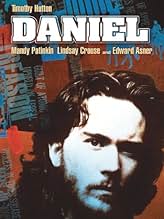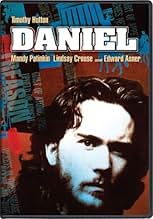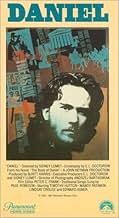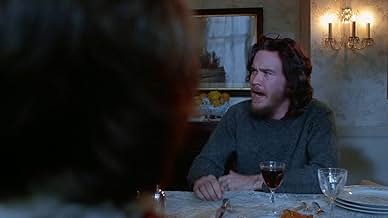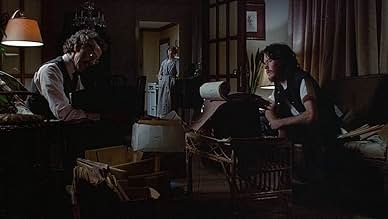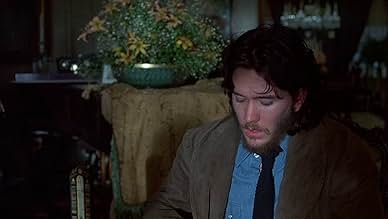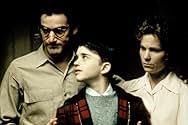Daniel
- 1983
- Tous publics
- 2h 10min
NOTE IMDb
6,6/10
1,7 k
MA NOTE
Daniel Isaacson tente de déterminer la véritable complicité de ses parents Paul et Rochelle Isaacson, exécutés pour espionnage dans les années 1950.Daniel Isaacson tente de déterminer la véritable complicité de ses parents Paul et Rochelle Isaacson, exécutés pour espionnage dans les années 1950.Daniel Isaacson tente de déterminer la véritable complicité de ses parents Paul et Rochelle Isaacson, exécutés pour espionnage dans les années 1950.
- Réalisation
- Scénario
- Casting principal
Ilan Mitchell-Smith
- Young Daniel
- (as Ilan M. Mitchell-Smith)
Avis à la une
The story of Julius and Ethel Rosenberg, who were executed in 1953 on the trumped-up charge of spying for the Soviet Union, "Daniel" is fictionalized but still relevant. Mandy Patinkin and Lindsay Crouse play the Julius and Ethel characters Paul and Rochelle Isaacson, while Timothy Hutton is their son Daniel, trying all his life to try and find out what happened to them, and what was behind it.
I actually know Robert Meeropol (Julius and Ethel's real son). After he and his brother found out the truth behind their parents' execution (that the McCarthyites wanted to eliminate any opposition), they sued the government and won. They established the Rosenberg Fund for Children, to protect the families of political prisoners. On the 50th anniversary of his parents' execution, Robert Meeropol reminded the world that the "War on Terrorism" has replaced the Cold War.
As long as totalitarian governments exist, "Daniel" will remain a relevant movie. Or even under democracy, to remind people of despotism.
I actually know Robert Meeropol (Julius and Ethel's real son). After he and his brother found out the truth behind their parents' execution (that the McCarthyites wanted to eliminate any opposition), they sued the government and won. They established the Rosenberg Fund for Children, to protect the families of political prisoners. On the 50th anniversary of his parents' execution, Robert Meeropol reminded the world that the "War on Terrorism" has replaced the Cold War.
As long as totalitarian governments exist, "Daniel" will remain a relevant movie. Or even under democracy, to remind people of despotism.
7sol-
After his worried sister suffers a nervous breakdown, a graduate student tries to investigate whether his parents were really guilty of being Soviet spies in this solemn drama from Sidney Lumet. The film is loosely based on an actual married couple who were executed in the 1950s with their young children forced to grow up without them. The film shares some striking similarities with Lumet's latter 'Running on Empty' as it spins a tale of two youths trying to live their own lives separate from their parents' political actions. Not nearly as well-known or acclaimed, 'Daniel' is beset by an unhelpful, overly complex narrative structure that jumps randomly between time periods. Some of the supporting performances are also overwrought. The film does well though depicting Daniel and his sister's difficulties as children removed from their parents. The harsh times they experience in a state run institution are especially potent and the bond between the pair is heartfelt. Timothy Hutton is also perfectly cast in a passionate performance as the adult title character and his on/off narration of how the electric chair works is effectively eerie. Speaking of which, the eventual execution scenes are handled very well. On one hand, 'Daniel' is a bit of a mess with its time period leaps and inconsistent performances, but its portrait of a young man haunted by his parents' fate truly resonates.
DANIEL
"Some day I shall understand"
Some words abouts the complex story. Paul and Rochelle Isaacson (Mandy Patinkin, Lindsay Crouse) were executed in the early 1950s for alleged espionage. Their children Daniel and Susan can't get over this. In the late 1960s, after an attempted suicide of his politically active sister Susan (Amanda Plummer), the rather unpolitical Daniel (Timothy Hutton) tries to find out what exactly happened in the past, tries to understand his parents' lives, tries to help his sister and to get along with his own life...
Sidney Lumet's film "Daniel" (1983) and E.L. Doctorow's novel "The Book of Daniel", which it is based upon, are inspired by the controversial Rosenberg case.
The film shows how children can be affected by the lives of their parents. And it is about the search of one's place in life. Lumet treated these themes again later in his fascinating "Running on Empty" (1988), starring River Phoenix, Christine Lahti and Judd Hirsch. Another theme of "Daniel" is the wish of human beings to understand their parents. Lumet described the movie in a Village Voice interview in the following way: "To me, "Daniel" is the story of a boy who buries himself with his parents, and spends the rest of his life trying to climb out of the grave." The film uses a complex flashback structure to tell its story. "Daniel" illuminates from Daniel Isaacson's view the history of the American left from the 1930s to the late 1960s, including the different left movements. In its criticism of death penalty and McCarthyism, "Daniel" is also a political statement.
Sidney Lumet is one of the great directors of the American cinema. Lumet himself is politically left-leaning, and "Daniel" is probably one of his most personal works. It was about seven years before he got the chance to realize this project. Many people worked on the film for the minimum salary set by the union. Timothy Hutton turned down a million-dollar offer on a film and played Daniel instead for about 25000 dollars.
And Lumet is right when he writes in his informative book "Making Movies": "Despite its critical and financial failure, I think it's one of the best pictures I've ever done." The film proves again Lumet's ability to tell complex, emotionally absorbing, unsentimental stories. Everything works in this uncompromising picture. A few of Lumet's films were marred by their scripts ("The Appointment", "Power", "Family Business", "A Stranger Among Us"). But Doctorow's screenplay for "Daniel" is excellent and extraordinarily multi-layered. Lumet's direction is sensitive and fascinating. Timothy Hutton (who later starred with Nick Nolte and Armand Assante in "Q & A"), Edward Asner (who plays the Isaacson's attorney), Lindsay Crouse (who also appeared in "Prince of the City" and "The Verdict"), Mandy Patinkin, Amanda Plummer and Ilan M. Mitchell-Smith (in the role of the young Daniel in the early 1950s) stand out in a fine cast. The impressive cinematography, which supports the flashback structure by a careful use of color filters, is by Andrzej Bartkowiak, who has worked on 11 Lumet pictures up to now. The rich soundtrack, mainly consisting of songs interpreted by Paul Robeson, perfectly fits and illustrates the film's themes. The editing is excellent as well (a good example is the brilliantly filmed end sequence).
There are many great moments in this film. For instance, there is a powerful rally scene in which you can feel that the Isaacson's children are afraid of the world around them. Another moving scene is a sequence in which young Daniel and young Susan (played by Ilan M. Mitchell-Smith and Jena Greco) walk through New York in search of their home. This scene, also showing Lumet's typically great use of the city of New York, reminded me of Michelangelo Antonioni.
I'm an admirer of Sidney Lumet's cinema. "Daniel" is one of his most underestimated motion pictures, really a must-see. Of course, don't expect standard Hollywood entertainment, but a serious work.
"Some day I shall understand"
Some words abouts the complex story. Paul and Rochelle Isaacson (Mandy Patinkin, Lindsay Crouse) were executed in the early 1950s for alleged espionage. Their children Daniel and Susan can't get over this. In the late 1960s, after an attempted suicide of his politically active sister Susan (Amanda Plummer), the rather unpolitical Daniel (Timothy Hutton) tries to find out what exactly happened in the past, tries to understand his parents' lives, tries to help his sister and to get along with his own life...
Sidney Lumet's film "Daniel" (1983) and E.L. Doctorow's novel "The Book of Daniel", which it is based upon, are inspired by the controversial Rosenberg case.
The film shows how children can be affected by the lives of their parents. And it is about the search of one's place in life. Lumet treated these themes again later in his fascinating "Running on Empty" (1988), starring River Phoenix, Christine Lahti and Judd Hirsch. Another theme of "Daniel" is the wish of human beings to understand their parents. Lumet described the movie in a Village Voice interview in the following way: "To me, "Daniel" is the story of a boy who buries himself with his parents, and spends the rest of his life trying to climb out of the grave." The film uses a complex flashback structure to tell its story. "Daniel" illuminates from Daniel Isaacson's view the history of the American left from the 1930s to the late 1960s, including the different left movements. In its criticism of death penalty and McCarthyism, "Daniel" is also a political statement.
Sidney Lumet is one of the great directors of the American cinema. Lumet himself is politically left-leaning, and "Daniel" is probably one of his most personal works. It was about seven years before he got the chance to realize this project. Many people worked on the film for the minimum salary set by the union. Timothy Hutton turned down a million-dollar offer on a film and played Daniel instead for about 25000 dollars.
And Lumet is right when he writes in his informative book "Making Movies": "Despite its critical and financial failure, I think it's one of the best pictures I've ever done." The film proves again Lumet's ability to tell complex, emotionally absorbing, unsentimental stories. Everything works in this uncompromising picture. A few of Lumet's films were marred by their scripts ("The Appointment", "Power", "Family Business", "A Stranger Among Us"). But Doctorow's screenplay for "Daniel" is excellent and extraordinarily multi-layered. Lumet's direction is sensitive and fascinating. Timothy Hutton (who later starred with Nick Nolte and Armand Assante in "Q & A"), Edward Asner (who plays the Isaacson's attorney), Lindsay Crouse (who also appeared in "Prince of the City" and "The Verdict"), Mandy Patinkin, Amanda Plummer and Ilan M. Mitchell-Smith (in the role of the young Daniel in the early 1950s) stand out in a fine cast. The impressive cinematography, which supports the flashback structure by a careful use of color filters, is by Andrzej Bartkowiak, who has worked on 11 Lumet pictures up to now. The rich soundtrack, mainly consisting of songs interpreted by Paul Robeson, perfectly fits and illustrates the film's themes. The editing is excellent as well (a good example is the brilliantly filmed end sequence).
There are many great moments in this film. For instance, there is a powerful rally scene in which you can feel that the Isaacson's children are afraid of the world around them. Another moving scene is a sequence in which young Daniel and young Susan (played by Ilan M. Mitchell-Smith and Jena Greco) walk through New York in search of their home. This scene, also showing Lumet's typically great use of the city of New York, reminded me of Michelangelo Antonioni.
I'm an admirer of Sidney Lumet's cinema. "Daniel" is one of his most underestimated motion pictures, really a must-see. Of course, don't expect standard Hollywood entertainment, but a serious work.
Daniel is one of Sidney Lumet's favourites of his own films. He cites it even before Dog Day Afternoon, Network and 12 Angry Men. I guess when a film isn't as assimilated into pop culture as they are you can keep it closer to your heart. It's a shame, the film deserves so much more attention. This is no half hearted venture. It's emotionally charged and meticulous in all its details. From the textured cinematography (great use of colour changes for past and present), slick editing and rousing performances, you can feel the heat of the passion poured into it. And it hits some real movie magic moments, especially with Mandy Patinkin. Perhaps the problem is that it lacks a real hook to real you in. Its purpose is clear, the activism is justified, but it feels quite specific to its two time periods and struggles to resonate the same way now. It's a film that really needed to strike its chord when it was released. But that doesn't hold it back from being a deeply poignant experience, the highlight being Timothy Hutton's powerful performance as the titular protagonist.
8/10
8/10
This movie,impressively directed and played by both the main and supporting actors,poses to us a question:do parents have the right to sacrifice the future of their children on the altar of their ideology? That their ideology and practice,Communism and its world wide tentacles,was seriously flawed and misguided,is more clear today than it was at the time the movie was made, before the collapse of the Soviet Union and its underpinning ideology. The plot centers over the attempts of convicted spies(for the Soviet Union)son to uncover a truth he believes exists,only to find a different reality,very perplexing. The message one may take from the plot is that evaluating one's parent from the perspective of an adult is both difficult and painful,truly entering a lions den.
Le saviez-vous
- AnecdotesReportedly, actor Timothy Hutton wanted his part so much he had his agent constantly telephone director Sidney Lumet to organize an interview. Later, Hutton flew to New York at his own cost, met with Lumet, and within twenty minutes had secured the role.
- Citations
Paul Isaacson: If they didn't arrest people, they'd have nothing to do.
- Versions alternativesNBC edited 33 minutes from this film for its 1987 network television premiere.
- ConnexionsFeatured in By Sidney Lumet (2015)
Meilleurs choix
Connectez-vous pour évaluer et suivre la liste de favoris afin de recevoir des recommandations personnalisées
- How long is Daniel?Alimenté par Alexa
Détails
Box-office
- Montant brut aux États-Unis et au Canada
- 687 475 $US
- Montant brut mondial
- 687 475 $US
Contribuer à cette page
Suggérer une modification ou ajouter du contenu manquant



